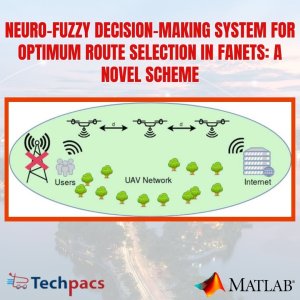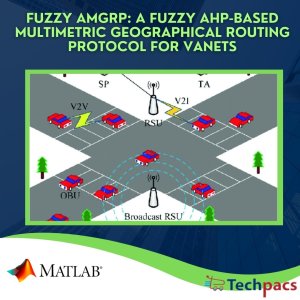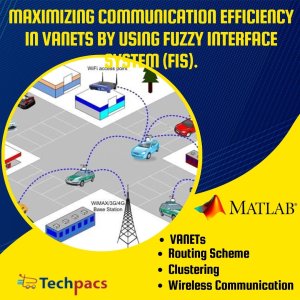Intelligent Handoff Management Using Fuzzy Logic and ANFIS: Optimizing Spectrum Handovers for Drone and Mobile Vehicle Applications
Problem Definition
The management of spectrum handoffs in Cognitive Radio Networks poses a significant challenge due to the complexity of transitioning communication bands for secondary users (SUs) while maintaining seamless communication. The heterogeneous nature of CRNs, along with varying coverage areas of different networks, further complicates this process. Traditional handoff techniques may not be effective in such dynamic and unpredictable network environments, necessitating the use of intelligent techniques like Adaptive Neuro Fuzzy Inference System (ANFIS) for accurate decision-making. With a two-set control system based on Fuzzy Logic, ANFIS aims to optimize spectrum handoffs by monitoring SU power to reduce interference and determining handoff decisions based on crucial parameters such as primary user (PU) signal intensity, distance between PU and SU, and SU-PU interference. The frequent adjustment of operating frequencies by SUs to accommodate spectrum changes can lead to undesirable effects like the ping-pong effect, underscoring the need for a more sophisticated approach to spectrum management in CRNs.
Objective
The objective of the proposed work is to implement a Fuzzy Logic based decision-making system in Cognitive Radio Networks to address the challenges posed by Spectrum Handoffs. By incorporating factors such as SU velocity into the inference system, the aim is to minimize the frequency of Spectrum HOs and reduce the ping-pong effect in CRNs. The use of Fuzzy Logic allows for adaptive decision-making based on parameters such as PU signal intensity, distance between PU and SU, and interference levels, thereby improving the spectrum management process in heterogeneous network environments. The system aims to handle uncertainty and adapt to changing network conditions while optimizing spectrum utilization and enhancing the overall performance of cognitive radio systems.
Proposed Work
In Cognitive Radio Networks, the problem of Spectrum Handoff (HOs) poses a challenge due to the need for accurate transitions between bands to maintain uninterrupted communication. This complexity is further exacerbated by the heterogeneous nature of networks and coverage areas. To address this issue, the proposed work aims to implement a Fuzzy Logic based decision-making system to reduce the ping-pong effect in CRNs. By incorporating factors such as SU velocity into the inference system, the aim is to minimize the frequency of Spectrum HOs and enhance the overall efficiency of the network. The use of Fuzzy Logic allows for adaptive decision-making based on parameters like PU signal intensity, distance between PU and SU, and interference levels, thereby improving the spectrum management process.
The rationale behind choosing Fuzzy Logic for decision-making lies in its ability to handle the uncertainty and imprecision inherent in CRNs. By utilizing a Fuzzy Logic control system, the proposed approach can adapt to changing network conditions and make informed decisions regarding Spectrum HOs. Additionally, by considering the velocity of SUs as a key factor in the decision-making process, the system aims to minimize the occurrence of unnecessary handoffs that can lead to the ping-pong effect. By focusing on the interaction between UMTS and WLAN networks within the CRN framework, the proposed system seeks to optimize spectrum utilization and enhance the overall performance of cognitive radio systems.
Application Area for Industry
This project can be applied in various industrial sectors such as telecommunications, defense, transportation, and healthcare where wireless communication plays a crucial role. The proposed Fuzzy Logic based inference system can be utilized to optimize spectrum handoffs in Cognitive Radio Networks, reducing the ping-pong effect caused by frequent frequency adjustments. In the telecommunications industry, for example, this solution can enhance the efficiency of spectrum management and improve the overall quality of service for users. Similarly, in the defense sector, where secure and reliable communication is essential, the implementation of intelligent techniques like ANFIS can ensure seamless communication in heterogeneous network environments. By considering factors such as the velocity of secondary users, the system can minimize unnecessary spectrum handoffs and interference, thus offering significant benefits in terms of network stability and performance across different industrial domains.
Application Area for Academics
The proposed project can significantly enrich academic research, education, and training in the field of Cognitive Radio Networks. By incorporating a Fuzzy Logic based inference system that considers the velocity of SUs, the project addresses a critical factor that can help reduce the ping-pong effect and minimize the number of Spectrum HOs. This enhancement not only contributes to the advancement of research in spectrum management frameworks but also offers valuable insights into the complexities of cognitive radio networks.
The relevance of this project lies in its potential applications for innovative research methods, simulations, and data analysis within educational settings. Researchers, MTech students, and PhD scholars in the field of wireless communication, networking, and artificial intelligence can leverage the code and literature of this project to explore new avenues of study, develop advanced algorithms, and contribute to the growing body of knowledge in the domain of Cognitive Radio Networks.
The technologies and research domains covered by this project include Fuzzy Logics, ANFIS, and Cognitive Radio Networks. By focusing on the interaction between UMTS and WLAN networks, as well as the impact of SUs' velocity on Spectrum HOs, the project offers a comprehensive perspective on spectrum management in heterogeneous wireless environments.
The field-specific researchers can benefit from this project by gaining insights into the complexities of Spectrum HOs, the role of Fuzzy Logic in decision-making processes, and the potential strategies for optimizing the performance of Cognitive Radio Networks. MTech students can use the project as a foundation for conducting in-depth research projects or developing practical solutions for real-world deployment. Similarly, PhD scholars can explore the implications of the project for future advancements in spectrum management, network optimization, and cognitive radio technology.
In conclusion, the proposed project has the potential to enrich academic research, education, and training by offering a comprehensive understanding of spectrum management frameworks in Cognitive Radio Networks. By incorporating innovative algorithms, simulations, and data analysis techniques, the project provides a valuable resource for researchers, students, and scholars seeking to explore the complexities and challenges of wireless communication systems. The future scope of this project includes expanding the research to incorporate additional parameters, enhancing the accuracy of decision-making processes, and exploring new avenues for optimizing Spectrum HOs in heterogeneous wireless environments.
Algorithms Used
Fuzzy Logics: The Fuzzy Logic algorithm is used in the project to develop an inference system that considers the velocity of Secondary Users (SUs). The velocity of SUs plays a significant role in causing the ping-pong effect and multiple Spectrum Handovers (HOs) may occur as a result. By incorporating Fuzzy Logic, the system aims to reduce the occurrence of Spectrum HOs by taking into account the velocity factor in the decision-making process.
ANFIS (Adaptive Neuro Fuzzy Inference System): ANFIS is a type of artificial neural network that combines the capabilities of fuzzy logic and neural networks to improve accuracy in decision-making processes. In this project, ANFIS is likely used to further enhance the efficiency of the Fuzzy Logic based inference system.
By incorporating ANFIS, the system can adapt and learn from data to make more accurate and precise decisions based on the dynamic environment of Cognitive Radio Networks (CRNs) consisting of UMTS and WLAN networks.
Keywords
SEO-optimized keywords: Spectrum management, Spectrum handoff, Cognitive Radio Networks, ANFIS, Fuzzy Logic, Intelligent techniques, Resource management, Wireless communication, Ping-pong effect, Velocity of SU, Cognitive Radio, CRN, UMTS, WLAN, Mobility management, Connectivity management, Network protocols, Dynamic resource allocation, Quality of service, Autonomous vehicles.
SEO Tags
cognitive radio networks, spectrum handoff, spectrum management, ANFIS, fuzzy logic, SUs, PUs, ping-pong effect, velocity of SU, cognitive radio, CRN, UMTS, WLAN, handoff management, intelligent handoff, decision-making, drone applications, mobile vehicle applications, UAV, intelligent transportation systems, network optimization, mobility management, connectivity management, handoff algorithms, seamless handover, network protocols, dynamic resource allocation, quality of service, autonomous vehicles
| Shipping Cost |
|
No reviews found!

















































No comments found for this product. Be the first to comment!